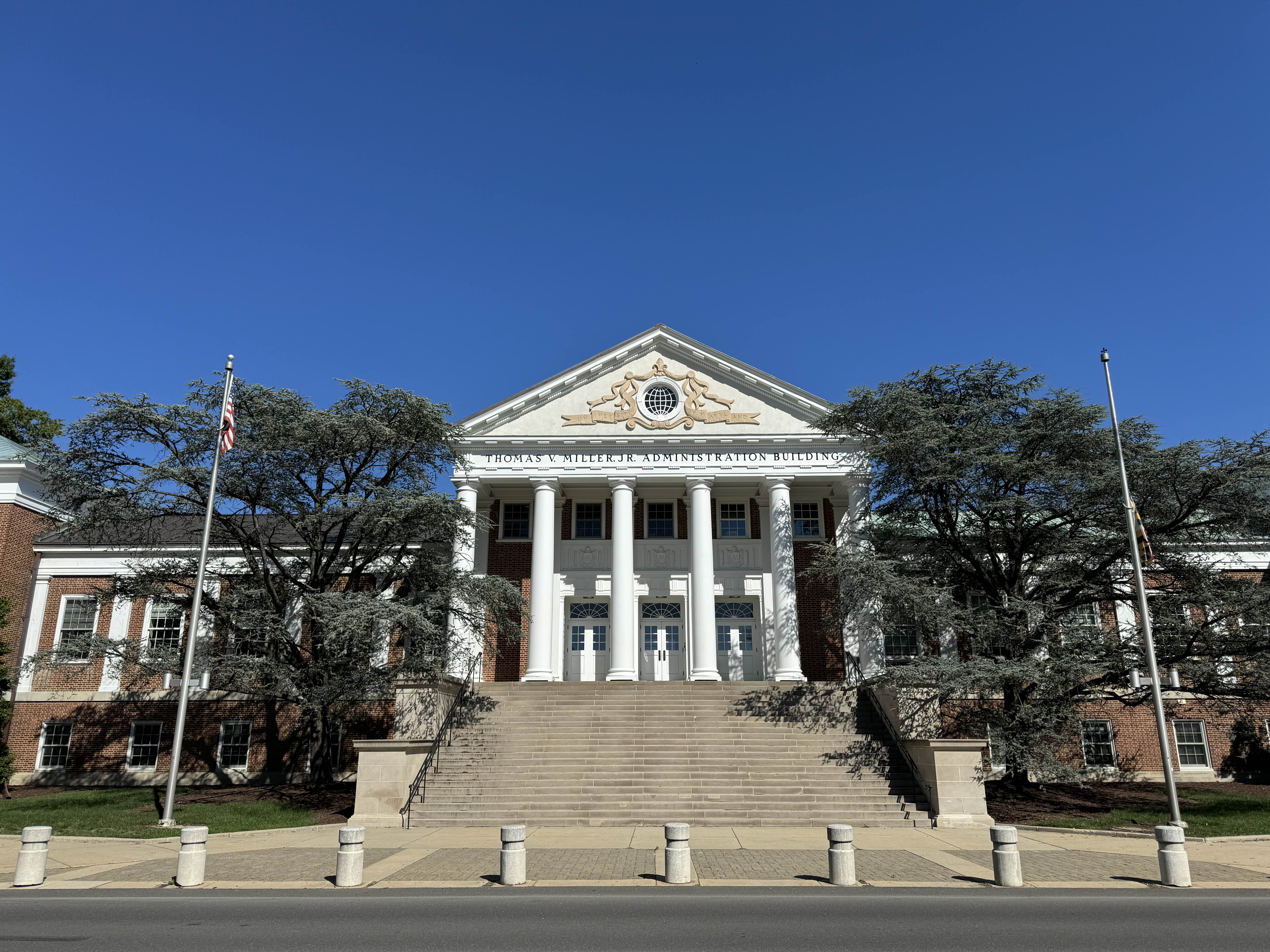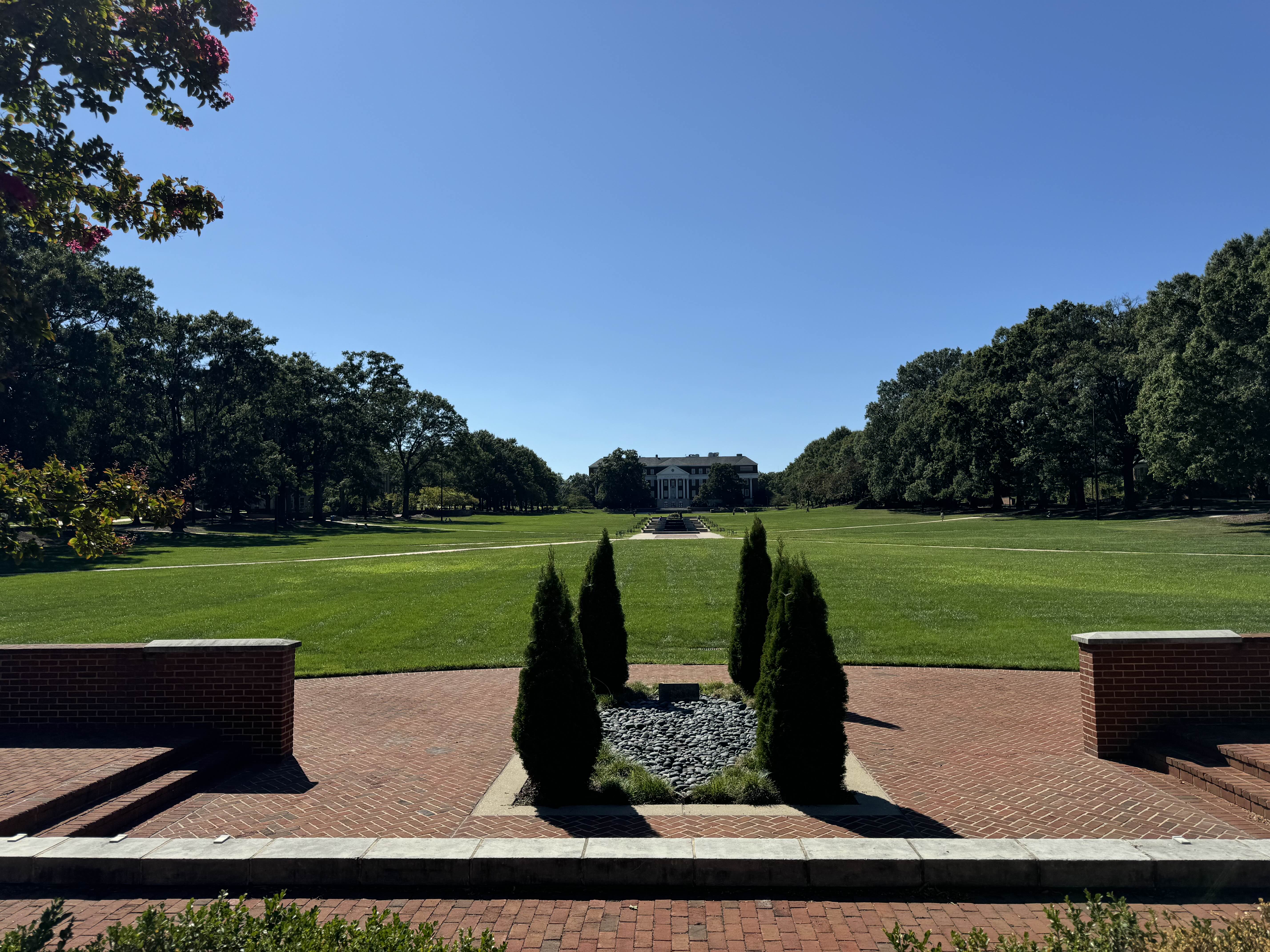UMD limits demonstrations on Oct. 7 after controversy over planned pro-Palestinian protest

The Thomas V. Miller, Jr. Administration Building at the University of Maryland, College Park, home to the Office of the President. ZFJ/Alvin Wu
COLLEGE PARK, Md., Sept. 6 (ZFJ) — The University of Maryland, College Park, will not allow any student group protests on Oct. 7, 2024, following controversy over a pro-Palestinian protest planned for that date.
The University System of Maryland said in a press release on Sunday, Sept. 1, that special campus events—those requiring approval or permitting—will be suspended only on Oct. 7 in favor of a “university-sponsored Day of Dialogue” to promote reflection instead. Expressive events will be permitted before and resume after Oct. 7.
“The intent is not to abridge students’ right to free expression; the intent is, instead, to be sensitive to the needs of our students,” said the System. “Our university communities may use this day to safely come together to reflect and to share, to learn and to listen, and, yes, to challenge one another. That’s the premise—and the promise—of higher education.”
The significance of Oct. 7, 2023, is that it was the day when Hamas militants stormed into nearby Israeli towns from the blockaded Gaza Strip, killed hundreds of civilians, and took hostages. The attack coincided with a major Jewish holiday and shocked Israel’s military and intelligence officials. The Israeli government immediately declared war on Hamas and has been prosecuting it since.
The controversy began when UMD’s Jewish Student Union posted an Instagram Story saying that the university had granted a permit to the UMD chapter of the Students for Justice in Palestine (UMD SJP) as well as UMD Jewish Voice for Peace (JVP) for a joint event on Oct. 7.
Opposition to the planned event began to mount. A letter to university officials circulated expressing concerns that the protest would create a “hostile environment” for the Jewish community on campus.
Among SJP’s actions that the letter listed as “direct threat[s] to the safety of the Jewish community at UMD” include “any effort to celebrate the death of 1,200 members of our community on October 7,” mentions of “from the river to the sea, Palestine will be free,” accusations of Israel committing genocide, and “mention[s] of Israel as an apartheid state.”
It also called on UMD to send “trained observers…who are empowered to immediately shut down the event” if antisemitism policy violations occur.
“To be clear, we are not asking that SJP be denied their right to assemble,” reads the letter. “But we cannot abide an event [sic] that demonizes our community, applies a double standard to our community that is not used with any other group, or calls for the destruction of our community.”
UMD SJP and JVP pushed back against the criticism with a statement released on Instagram on Saturday, Aug. 31, in which they confirmed their plans to hold “a vigil to mourn the lives lost as a result of the settler-colonial Zionist entity’s 76-year campaign of rapacious occupation, ethnic cleansing, and genocide.”
“Since October 7th, over 186,000 Palestinians have been murdered. To claim that Palestinians cannot hold a day of remembrance in mourning one year of genocide, or lay any claim to that date is an insult to every life lost in the Zionist entity’s genocidal campaign.”
The death toll UMD SJP cites is from an article published in The Lancet, a British medical journal. A recent news report from The Associated Press, citing the Gaza Health Ministry, says the death toll is over 40,000 Palestinians.
Darryll Pines, president of the University of Maryland, College Park, acknowledged in a campus-wide email sent Sunday, Sept. 1, that “numerous calls have been made to cancel and restrict the events that take place” on Oct. 7. An article from The Diamondback, UMD’s college newspaper, citing a university spokesperson, says thousands of people contacted the university about UMD SJP’s plans.
Pines wrote that he requested a “routine and targeted safety assessment” from the University of Maryland Police Department that concluded that “there is no immediate or active threat.”
A UMD spokesperson declined to answer a question from The Zombie Fridge Journal on whether the safety assessment showed that there would be any substantial risks if protests were allowed to proceed on Oct. 7.
In consultation with the University System of Maryland and “out of an abundance of caution,” university officials decided to “host only university-sponsored events that promote reflection” on Oct. 7.
“Please continue to plan expressive activities in accordance with our policies. Let’s move forward this semester with voices being heard and safety our shared priority,” concluded Pines.
 A view of McKeldin Mall from in front of the Miller administration building. ZFJ/Alvin Wu
A view of McKeldin Mall from in front of the Miller administration building. ZFJ/Alvin Wu
The Jewish Student Union on campus thanked university officials for their decision and said in a statement posted on Instagram late Sunday night that it was “relieved that SJP will no longer be able to appropriate the suffering of our family and friends to fit their false and dangerous narrative.”
“Only university-sponsored events will occur on October 7th. While this is not an ideal situation, it ensures that our physical and psychological safety is protected on this day of grief.”
UMD SJP said in a post on Instagram on Monday, Sept. 2, that it was “deeply angered, though not surprised” by the university’s decision to cancel the group’s reservation for McKeldin Mall on Oct. 7.
“The university administration has capitulated to the racist campaign against our organization—a pressure campaign which employed charged and threatening language—as an excuse to manufacture vague safety concerns and a premise for canceling our peaceful event.”
“Rest assured that we will find ways to mark this one year of genocide and one year of resistance.”
The university, as a public institution receiving federal funding, cannot discriminate against groups on the basis of their viewpoints. For example, if it does not grant one student group permission to use McKeldin Mall on a certain day, it must also deny permission to all other student groups to do the same.
UMD, like many other universities across America, revised its freedom of expression policies following widespread pro-Palestinian protests on college campuses nationwide.
The presidents of Harvard University, University of Pennsylvania, and Columbia University have all resigned within the past year due to outrage over their handling of pro-Palestinian protests on their campuses, with donors threatening to pull substantial sums of money.
References
- UMD Students for Justice in Palestine, UMD Jewish Voice for Peace - @umd_sjp, @jvp_umd (Instagram) - https://www.instagram.com/p/C_WntvnPe2D/ We call the UMD community to stand with us in upholding the right of pro-Palestinian students on campus.
- Letter from the Community to Leaders of the University of Maryland - https://docs.google.com/forms/d/e/1FAIpQLSeRBDF4VzVJK0swE6IWT4CfJN31t3YZRSUjyEUTnYWN37i51g/viewform (ARCHIVE)
- University System of Maryland - The University System of Maryland on Marking October 7 - https://www.usmd.edu/newsroom/news/2427 (ARCHIVE)
- Office of the President, University of Maryland - Remembering the One-Year Anniversary of October 7, 2023 - https://president.umd.edu/articles/remembering-the-one-year-anniversary-of-october-7-2023 (ARCHIVE)
- UMD Jewish Student Union - @jsu.umd, @umdhillel, @terpsforisrael, @umd_mishelanu - https://www.instagram.com/p/C_Zca3vRYSD/?hl=en&img_index=1 A statement from the Jewish Student Union at UMD
- UMD Students for Justice in Palestine - @umd_sjp, @dmvpym, @dmvsjp, @md2palestine - https://www.instagram.com/p/C_bTHNQvMM3/?hl=en&img_index=1 🚨UMD SJP will NOT back down to threats by Zionists.
